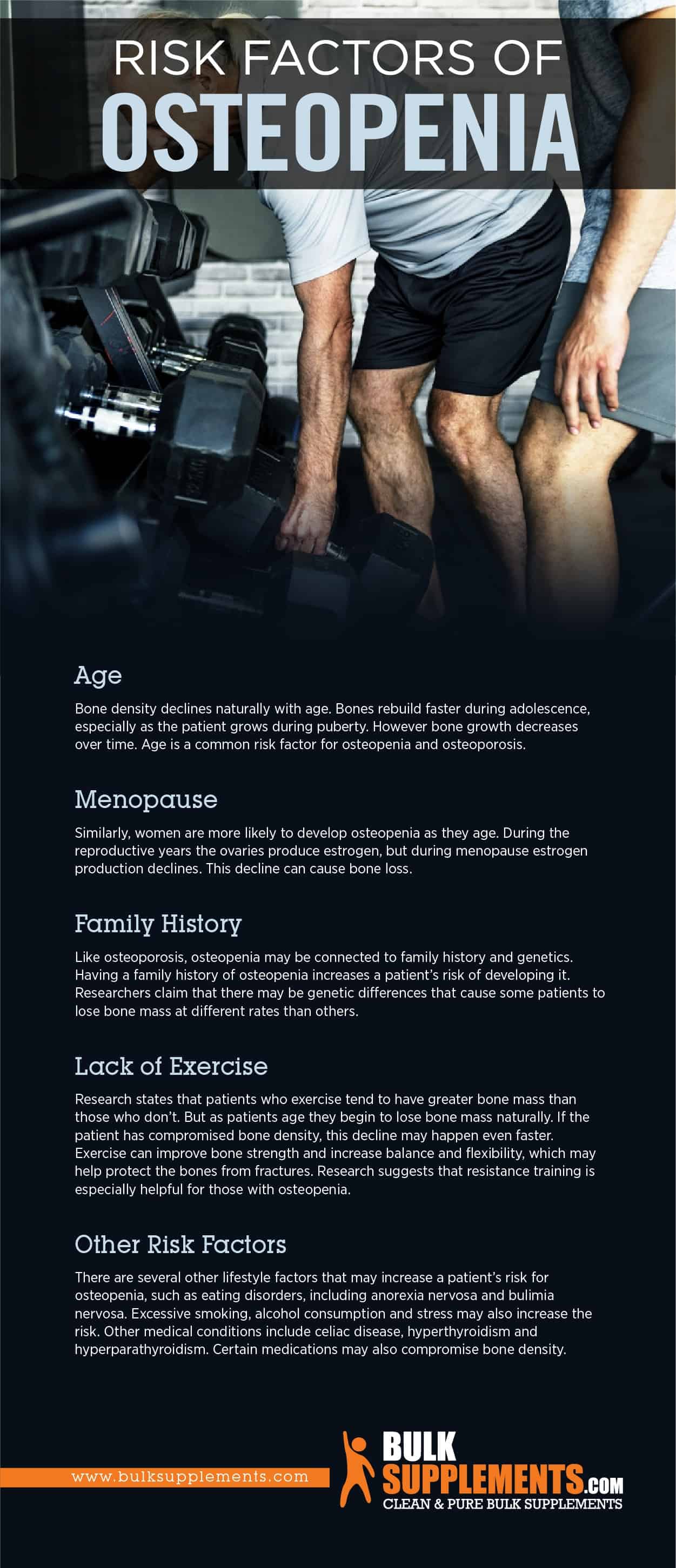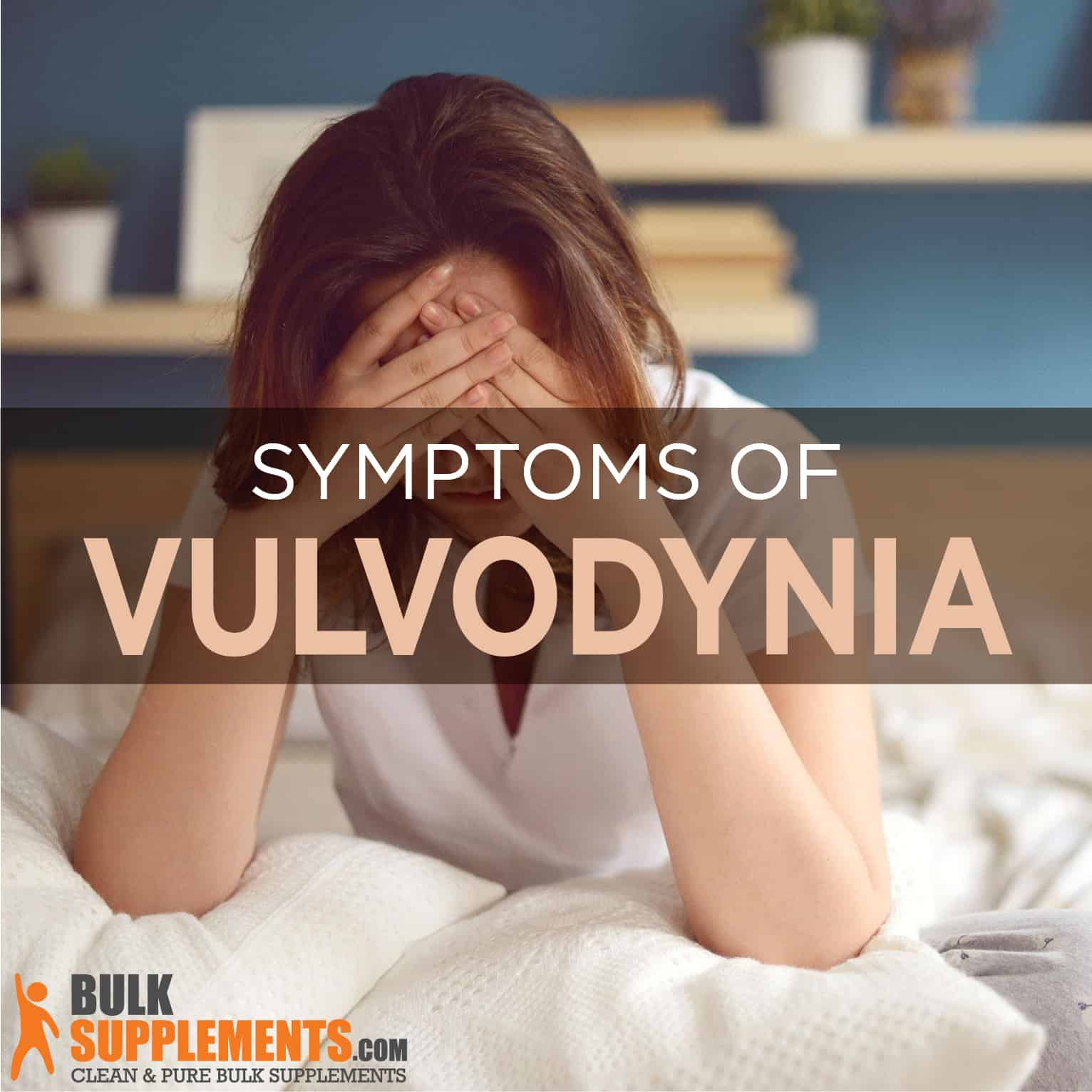Osteopenia: Causes, Symptoms & Treatment

Osteopenia
What is Osteopenia?
Similar to osteoporosis, osteopenia is when the body doesn’t make new bone mass as quickly as it absorbs it. Osteopenia is not as severe, but physicians consider osteopenia the halfway point between healthy bones and osteoporosis. Patients’ bones are the most dense at age 30 and osteopenia usually occurs after 50. However, if an individual has strong bones from a young age, it may reduce the risk.
The causes are virtually the same as osteoporosis and symptoms are similar, but they are not as intense. Family history and diet lacking vitamins and minerals can cause osteopenia and eventually osteoporosis. Women are characteristically more likely to develop osteopenia and osteoporosis since their bones are less dense. In addition, women typically consume less calcium (x). Thankfully, there are methods patients can take to help prevent osteopenia from forming in the body and there are also ways to manage the symptoms.
Symptoms of Osteopenia
Loss of Bone Density
The characteristic sign of osteopenia is loss of bone density. Although it’s not as severe as in osteoporosis, reduced bone density can still have serious impacts. By about age 30, the bones should be at their densest point and if they aren’t, it may signify potential bone loss conditions in the future. Osteoporosis can be hard to detect, but osteopenia is even harder because it does not usually cause any symptoms. When it does cause symptoms, patients may feel bone pain, tenderness and weakness in areas where it fractures. However, patients may actually experience fractures without feeling any pain.
Risk Factors for Osteopenia
Age
Bone density declines naturally with age. Bones rebuild faster during adolescence, especially as the patient grows during puberty. However bone growth decreases over time. Age is a common risk factor for osteopenia and osteoporosis.
Menopause
Similarly, women are more likely to develop osteopenia as they age. During the reproductive years the ovaries produce estrogen, but during menopause estrogen production declines. This decline can cause bone loss.
Family History
Like osteoporosis, osteopenia may be connected to family history and genetics. Having a family history of osteopenia increases a patient’s risk of developing it. Researchers claim that there may be genetic differences that cause some patients to lose bone mass at different rates than others.
Lack of Exercise
Research states that patients who exercise tend to have greater bone mass than those who don’t. But as patients age they begin to lose bone mass naturally. If the patient has compromised bone density, this decline may happen even faster. Exercise can improve bone strength and increase balance and flexibility, which may help protect the bones from fractures. Research suggests that resistance training is especially helpful for those with osteopenia.
Other Risk Factors
There are several other lifestyle factors that may increase a patient’s risk for osteopenia, such as eating disorders, including anorexia nervosa and bulimia nervosa. Excessive smoking, alcohol consumption and stress may also increase the risk. Other medical conditions include celiac disease, hyperthyroidism and hyperparathyroidism. Certain medications may also compromise bone density.

Treatment for Osteopenia
Exercise
Research states that exercise stimulates bone strength considerably. Physicians often recommend exercise to their patients to help keep the bones strong and support new bone formation. Specifically, female patients are less likely to lose bone density in the hips, lumbar spine and tibia because these bones are in load-bearing areas. But areas like the forearms are more likely to fracture because they contain non-load-bearing bones.
Physicians state that some of the best exercises to prevent and manage bone loss are weight-bearing and muscle strengthening exercise. Walking, elliptical machines, stair machines and low impact aerobics may also be beneficial. It is also important to maintain a healthy weight to avoid putting too much pressure on the bones and joints.
Diet
Diet also plays an important role in bone health. Certain vitamins and minerals promote bone health and it’s important to consume a well-balanced diet to get enough of these nutrients. Dairy, fatty fish, leafy greens, tomato products, potatoes, papayas, oranges and bananas are all good sources. Patients also need protein in their diets to keep the bones strong, but too much protein can have the opposite effect. Salty foods, caffeine, alcohol and legumes may interfere with bone production.
Supplements for Osteopenia
Patients can often get enough nutrients from including healthy, balanced foods in their diets. However, some patients may also benefit from taking dietary supplements to make sure they a consistent dosage of essential vitamins and nutrients. Supplements are not a definite tool to prevent or cure osteopenia or any other medical condition. Always consult a doctor for approval before starting a supplement regimen.
Vitamin D
Vitamin D helps bones by allowing the body to absorb calcium and supporting muscles to help prevent injury and bone fractures. Deficiencies can cause conditions like osteoporosis and rickets. Not only is it great for bone health, but it can also help with other conditions related to age, such as dementia and Alzheimer’s disease. As a dietary supplement, the recommended dosage for vitamin D3 (cholecalciferol) is 50 mg a day, unless a doctor recommends a different dosage.
Vitamin K
Vitamin K is the forgotten nutrient that can play an essential role for proper bone health and osteopenia prevention. It is common in dark leafy greens, prunes, avocados and kiwis. Vitamin K can especially slow down bone loss for women after menopause and increase overall bone strength, decreasing the risk of fractures. The recommended dosage for vitamin K1 1% powder is 10 mg daily. Use an accurate milligram scale to measure the dosage and consult a doctor before using it.
SEE ALSO

Vulvodynia: Risk Factors, Symptoms & Treatment
Calcium
Calcium is the most abundant mineral in the human body. The body needs calcium for vascular function, nerve transmission, muscle contraction and hormone signaling. Calcium also keeps the teeth strong. Humans constantly lose calcium through the hair, skin, nails, urine and sweat. The body cannot produce it, so without adequate amounts from food or supplements, it can affect health. As a dietary supplement, take 2,380 mg of calcium citrate powder once or twice a day with food. Consult a doctor for approval first.
Magnesium
Magnesium is important for maintaining blood pressure, regulating heartbeat and blood circulation and keeping the bones strong. The body needs this mineral more than zinc, iron or any other mineral. Studies show that magnesium may be an effective treatment for constipation, acid reflux and heartburn. The recommended dosage for magnesium citrate powder as a dietary supplement is 4,400 mg daily, after consulting a doctor.
Collagen
Collagen covers the skin, muscles and internal organs, holding everything in place as the body stretches. It helps keep the skin firm and wrinkle-free and supports strong and flexible joints. There are three different types of collagen: types one, two and three. Types one and three are best for skin and bone health and type two is more helpful for the joints. Because collagen production decreases over age, supplements may be a good way to get a healthy dosage to keep the bones and joints strong. As a dietary supplement, the recommended dosage for hydrolyzed bovine collagen powder is 2,500 mg two to four times a day on an empty stomach, or following a physician’s instructions.
The Bottom Line
Osteopenia is a halfway point between healthy bones and osteoporosis. Its symptoms are milder and harder to detect, but eventually osteopenia can develop into osteoporosis. It reduces bone density and can increase the risk of bone fractures and other injuries. Sometimes the condition does not produce symptoms but when it does, the patient often feels pain and weakness in the bones where fractures have occurred. However, some patients may suffer damage without even realizing it.
Bone density simply decreases with age and the body becomes less able to replace bone mass. However, there are other factors that may increase the risk, such as family history and genetics, vitamin and mineral deficiencies and lack of exercise. Patients can help prevent and manage the symptoms by exercising, maintaining a healthy weight and consuming a well-balanced diet with enough calcium, vitamin D, vitamin K and magnesium.
Although most patients get enough nutrients from their diets, supplements are another option to get a healthy dosage on a consistent basis. Supplements do not treat or completely prevent osteopenia or any other medical condition, but they aim to benefit overall health. Speak to a doctor before starting a supplement regimen. We only get one set of bones in our lives, so it’s important to take the best care of them!



